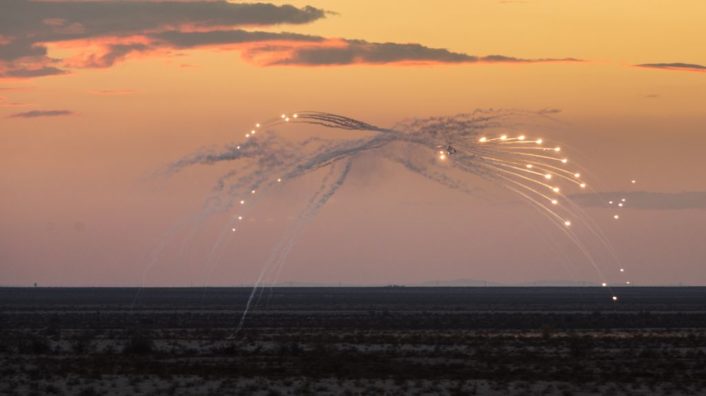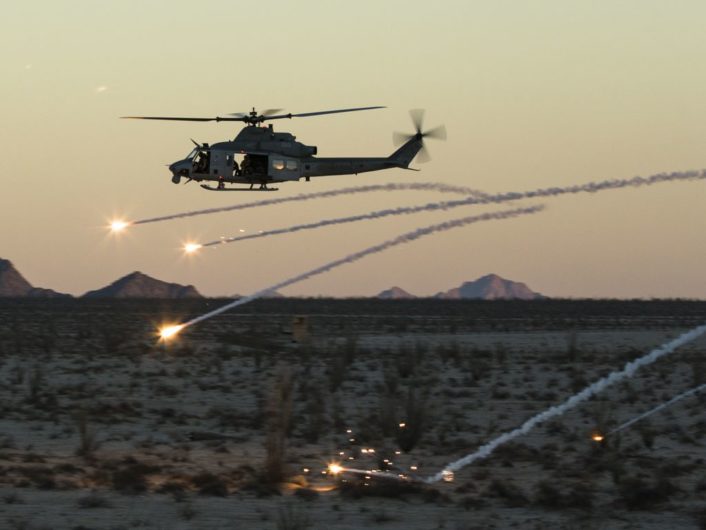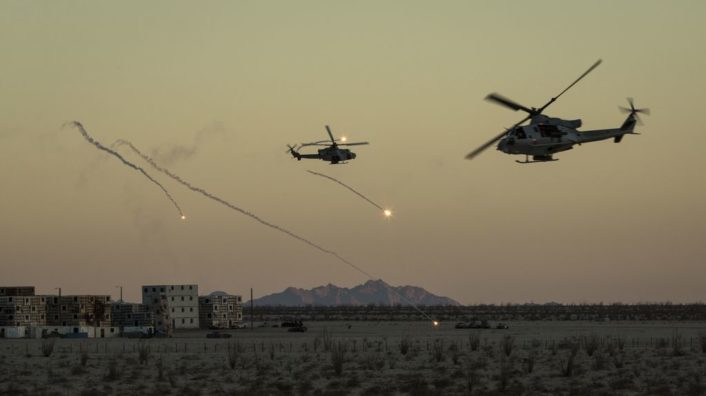Mattis is no doubt an aggressive commander who values “violence of action.” But he’s careful about when to take action. He led the troops at the tip of the spear during the 2003 invasion of Iraq, and saw first hand what happens when leaders over-rely on force and don’t consider the long-term consequences of their actions.
Mattis co-authored the U.S. military’s counter-insurgency manual with David Petraeus based in no small part on their experiences dealing with the invasion’s fallout. Petraeus — who oversaw the Surge — has often received the most credit, but Mattis has been a key player in rethinking how America fights.
Though he’s a warrior by trade, he knows there’s a wide range of tools countries can use to interact with the world and resolve conflicts — military force being just one.
“In this age, I don’t care how tactically or operationally brilliant you are, if you cannot create harmony — even vicious harmony — on the battlefield based on trust across service lines, across coalition and national lines, and across civilian/military lines, you need to go home, because your leadership is obsolete,” he once said.
“We have got to have officers who can create harmony across all those lines.”
Pres. Barack Obama appointed Mattis to lead U.S. Central Command overseeing all U.S. forces in the Middle East, where he won nearly universal praise among military officials
and the civilian diplomatic corps. He also formed close friendships with regional military leaders and diplomats — particularly in the
United Arab Emirates.
However, the Obama administration fired him, apparently as a result of his contentious relationship with several civilian appointees. It wasn’t a result of his “Mad Dog” reputation. It was because he asked pressing questions about the long-term consequences of American policies. And
kept pressing.
In particular, he was critical of the Obama administration’s handling of Iran and Syria. He pushed for a tougher stance against the Iranian regime, arguing that its terror network and proxies pose a serious threat to U.S. troops, civilians and regional allies.
Mattis was angered by a 2011 plot by Iranian agents to assassinate Adel Al Jubeir, Saudi Arabia’s ambassador to the United States. Mattis considered Al Jubeir a friend, and the attack — which would have been carried out with explosives in a Washington, D.C. restaurant — would have certainly killed Americans, too.
However, Mattis voiced skepticism of pushing a no-fly zone in Syria as he argued that regime artillery — not aircraft — were responsible for far more of the killings. As he saw it, a no-fly zone was a cop-out that wouldn’t actually solve anything.
Though he said he was moved by the plight of Syrian refugees, who he called “the most traumatized [refugees] I’ve ever seen,” he didn’t want to see a half-baked intervention without a proper end plan. He’d seen that before.
Mattis talks to wounded Marines in Iraq, 2006. U.S. Marine Corps photo
During a 2013 conference at the Aspen Institute, the then-newly minted civilian Mattis laid out his thoughts on the wars in a discussion with CNN’s Wolf Blitzer. In his remarks, Mattis made clear that he’s a strong proponent of working closely with allies, particularly those in the Middle East.
“Understand that there are people in this region that have bet everything on sticking with the United States,” he said. “So as you look at these situations you have to remember that we are not alone and there are a lot of people with us.”
His remarks at the conference are instructive about his views on war, diplomacy and America’s role in the world. Though he spoke highly of friends and colleagues that were members of the U.A.E. and Saudi elite, Mattis also spoke of the importance of the Arab Spring and youth-led democracy movements.
He referred to the forces of the Syrian regime as “thugs” for firing on unarmed pro-democracy activists — in contrast to Trump’s avowed admiration for Bashar Al Assad’s unapologetic brutality.
Mattis stressed that it’s important for Americans to understand that many people in the region — millions of them — want democratic reforms, and that it would be likely through education and diplomacy that these movements take form. “It’s not enough to be against something,” he warned.
The conference was held shortly before the Obama administration
reneged on a promise to give air support to the Free Syrian Army in a critical push — leading to a crushing defeat, demoralizing the Syrian rebels and providing an opening that the Islamic State was able to exploit.
Within a year, the Islamic State and other hardline militant groups had either killed or absorbed much of the remnants of the FSA.
During the presidential race, Mattis was briefly tapped by a group of “Never Trump” conservatives as a potential independent presidential candidate. He ultimately declined to run. Other than Mattis’ fiscally conservative views, he speaks little about his political beliefs outside of foreign policy and military affairs, and seemed to have little enthusiasm for the prospect of the sitting in the Oval Office.
As news came out that Trump had met with Mattis, a faction of Trump’s supporters who were energized by the campaign’s rhetoric about terrorism have lashed out on social media at Mattis’ potential appointment. Guess why — it’s because of his emphasis on working with Muslim allies.
These critics seem to be under the impression that wanting alliances makes Mattis — a man who once told insurgents “do not cross us, because if you do, the survivors will write about what we do here for 10,000 years” — too soft to take on jihadist terrorists.
However, Mattis is a favorite for the posting, and he enjoys nearly universal admiration from elected Republicans and Democrats alike. There are some legal hurdles to getting him appointed — he technically hasn’t been out of the military long enough to be Defense Secretary.
“Having Mattis run the Defense Department would put the Marines in their
most powerful position ever,” Thomas Ricks wrote at
Foreign Policy. “They’d have the Secretary of Defense, the Chairman Joint Chief of Staff and the commandant. If I were the Army I’d hunker down and plan for the future for a few years.”
It’s unclear how Trump’s inner circle feel about Mattis. According to several sources, Trump’s proposed National Security Adviser and confidant, retired Lt. Gen. Mike Flynn,
allegedly tried to cross Mattis’ name off the list of potential cabinet members.
Ricks noted at
Foreign Policy that Mattis outranks Flynn, “even in retirement.” He added, “Mattis also is far smarter, and better educated, than Flynn. That will help contain Flynn.”
During Trump’s meeting, he was surprised to learn that Mattis opposed torture. Mattis told him “I’ve never found it to be useful” and argued interrogators would do better with “a pack of cigarettes and a few beers,” according to Trump.
Trump told
The New York Times that his meeting with Mattis has prompted him to reflect on his torture stance, but stressed “I’m not saying it changed my mind.”
It remains to be seen whether Trump would actually be receptive to Mattis’ advice or recognize his expertise. Trump has previously bragged about “knowing more about ISIS than the generals.”
Mattis’ dismissal for asking tough questions and speaking his mind under Obama could easily be repeated under Trump, who is notorious for his furious reactions to criticism.
If Trump’s plans consist of re-energizing torture programs and mass killings of civilians as he talked about during his campaign, Mattis may have a lot to say. As Mattis once told his troops, the U.S. military is “the world’s most feared and trusted force. Engage your brain before you engage your weapon.”





















